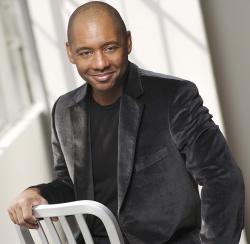
'Well tempered' Marsalis brings jazz. pop, Baroque to Lexington stage
The true charm of the new Branford Marsalis album In My Solitude isn't its meshing of jazz and classical genres, although the tightrope walk the celebrated saxophonist takes between the two is quite fascinating.
No, the most arresting aspect to the live recording, which will be released Tuesday, is its sound. With no accompaniment whatsoever, save for the acoustics of Grace Cathedral in San Francisco, the music of Marsalis sounds ancient — ghostly, even.
It could be the Wayne Shorter-like expression he conjures on soprano sax during the album-opening take on Steve Lacy's Who Needs It or the luscious warmth that envelops I'm So Glad We Had This Time Together (the closing theme music from The Carol Burnett Show) or the glorious echo that surrounds all 10 tunes with a subtle, timeworn sheen.
On first listen, In My Solitude recalls the otherworldly recordings the great Norwegian saxophonist Jan Garbarek cut for the European ECM label, especially the glorious works where he replaced a conventional rhythm section with the magnificent vocal command of the Hilliard Ensemble. True to ECM form, the resulting music leaned neither to the Hilliards' love of tone and classical nuance or the Nordic blasts of improvisational chill that were earmarks of Garbarek's playing.
What those records discovered was a fascinatingly stark musical world in between where the unison playing sounded like it had traveled through centuries from a land equally distant.
Marsalis' playing on In My Solitude isn't as removed or unsettled as Garbarek's, but it's just as beautifully indefinable. What's more, he discovers such uncharted terrain on his own. Grace Cathedral serves as a fine playground. But Marsalis, long known for the fearlessness he has shown while leading several long-running jazz quartets, luxuriates within the stylistic middle ground his new recording calls home.
Instead of tireless tenor blasts of boppish zeal and fractured swing, Marsalis sounds almost confessional. It doesn't matter if the music tips the scales to Baroque by transforming Bach's Sonata in A Minor for Oboe into a vehicle for saxophone or dresses the second of three untitled improvisational pieces with animated bounce and echo.
But on the third improvisational tune, the real world intrudes as the sound of a passing siren surfaces amid the playing. All of a sudden, Marsalis' musical Nirvana turns urban.
How does all of this bode for the saxophonist's return to the Singletary Center for the Arts on Sunday? Hard to say. It won't be a jazz concert, but it won't be the subtle solo manifesto of In My Solitude either.
Marsalis' collective accomplice will be the Chamber Orchestra of Philadelphia and his program, titled Marsalis Well-Tempered, will lean heavily to works by Henry Purcell, Tomaso Albinoni and Louis-Antoine Dornel. Lest anyone think Marsalis Well-Tempered will surrender fully to the Baroque, recent reviews have mentioned the saxophonist has been adding a version of the jazz/pop classic Autumn Leaves to the early music mix of his current performances.
Surprising? Not when you consider Marsalis' last two albums consisted of a jazz session with his current quartet (2012's Four MFs Playing Tunes) and a collection of duets with longtime pianist Joey Calderazzo (2011's Songs of Mirth and Melancholy). But genre jumping seems even more logical when you consider the other 2014 release to generously feature Marsalis.
Earlier this year, the latest archival recording from the concert vaults of the Grateful Dead was issued as the three-disc Wake Up to Find Out. It chronicles a March concert performed at New York's Nassau Coliseum.
Among the set's many thrills is an atypically cheery 18-minute version of the warhorse Dead anthem Dark Star, where the scholarly wail of Marsalis' tenor sax goes a few rounds with guitarist Jerry Garcia and keyboardist Brent Mydland.
Alone on record in a cathedral, alive onstage with a chamber orchestra and literally brought back from the Dead for a collection of 24-year-old jams — such are the musical travels of the well-tempered Marsalis.